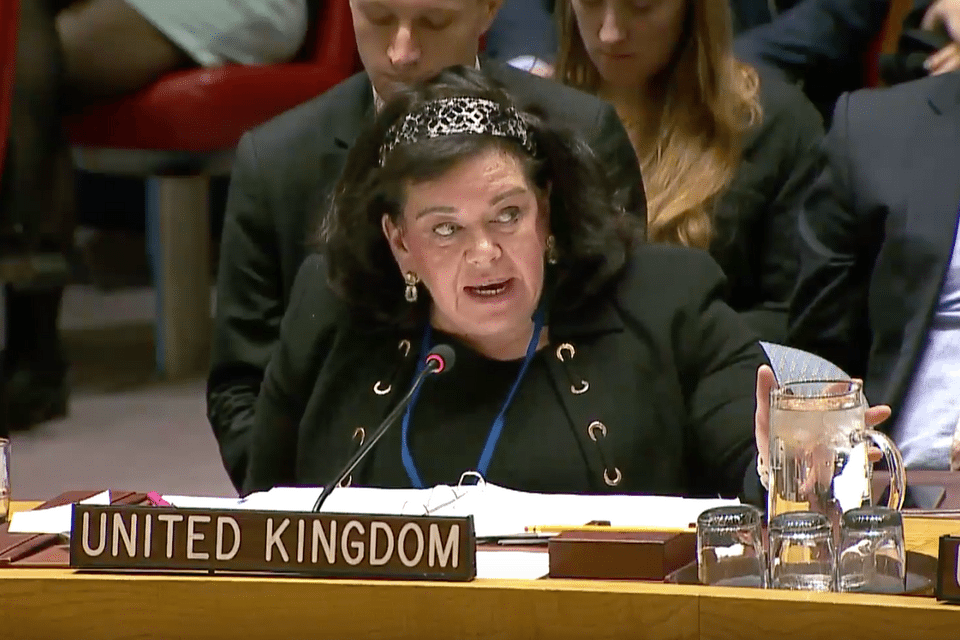Supporting a UN-led political solution in Yemen
Statement by Ambassador Karen Pierce, UK Permanent Representative to the UN, at the Security Council Briefing on Yemen.

Thank you very much indeed, Mr President. Welcome to the new Special Envoy. Thank you for your briefing Martin. Thank you to Mark Lowcock for his assessment and welcome to our Yemeni colleagues.
It’s a desperate situation, Mr President, and it is clear, as the Special Envoy set out, it can only be resolved ultimately through a political solution. I think we all agree on that. I think what the Under-Secretary-General said about the humanitarian consequences and particularly eight million people being close to starvation and one million people at risk of cholera and similar illnesses is absolutely shocking and that ought to be a spur to action for the Council. I think the international community must do whatever we can to enable the Special Envoy to develop his plan at the pace that he has just outlined to us. And I just want to say I really welcome the clarity and the elements of that plan that he set out. I hope we can, as an international community, pool all our influence and urge the parties to engage in good faith with the UN process. Although the conflict has some quite desperate humanitarian consequences, this is a solvable conflict.
I think the Under-Secretary-General said if we had swift and joint action, Mr President, then we can make some very good progress. So I think that’s absolutely where we should put our efforts. And as a Council, I hope that we can encourage people to grant full and unhindered access to Yemen for the Special Envoy, for his team, for the humanitarian actors. And in that respect, the meetings that the Envoy laid out in the region, including in Sana’a with senior Houthi leaders are extremely welcome.
I’d like if I may just to highlight a couple of areas for specific immediate action.
The Under-Secretary-General mentioned financial pledges and I agree the scale of the generosity from Saudi Arabia and the UAE and Kuwait are all quite remarkable. We ourselves as the United Kingdom have provided a quarter of a billion dollars for this year and next. I think we all know that money alone won’t be enough. We do need to do more to get commercial supplies in. I was concerned about the foreign exchange problem, Mr President, because in Yemen a lot of the food and supplies that go in need to come from commercial sources. Humanitarian assistance can’t manage the scale required. Commercial shipping needs to be able to go in and this is vital to water and sanitation systems. So I do hope we can all find ways to urge collaboration on that.
I think the second point is around access to Houthi controlled areas where we see very many severely malnourished children. We had a Presidential Statement in March that highlighted the importance of vaccination campaigns as the Under-Secretary General said.
And then I think thirdly, I just want to echo the call about paying non-military public workers. Families don’t have the means to buy food. They don’t have the means to buy medicine and half of the health facilities have closed, so this is all contributing to a more desperate situation in Yemen than needs to be objectively the case.
I also would now like to turn to regional stability. The impact on regional stability of this conflict is growing and it’s dangerous. It puts Saudi Arabia at risk. It puts Saudi citizens at risk. The continued Houthi missile attacks including the use of ballistic missiles at civilian targets in Saudi Arabia attract our outright condemnation. Deliberate targeting of civilian areas is abhorrent. It is against international law, against international humanitarian law. We call on all parties involved in the conflict to abide by their international humanitarian law obligations. And as the Under-Secretary General set out, this is still not being done to a sufficient degree.
But I also want to stress that it really is a national security threat to Saudi Arabia and this in turn is driving renewed conflict on the ground. So it is vital and I hope the Council can help with this that all Member States fully implement the arms embargo that the Council has laid down.
In particular the UN Panel of Experts has concluded that missiles and related to material of Iranian origin has been introduced into Yemen after the imposition of the targeted to arms embargo. That in turn means Iran is in non-compliance with Security Council Resolution 2216. So we strongly urge Iran to desist from destabilizing activity and we encourage all Member States to use whatever influence they have to ensure that the supply of missiles fueling the conflict inside Yemen stops.
Mr President, I really do want to stress something the Special Envoy said about this being possible to make progress. We have within our grasp the ability to really do something to help bring this conflict to an end. I think that’s a very important contribution that the Council can make for regional and international peace and security at a time when we see so many problems on so many other issues. So I would like to conclude, Mr President, by urging all members of the Council really to put our shoulders to the wheel, to support the UN, and try and bring peace to Yemen.
Thank you.